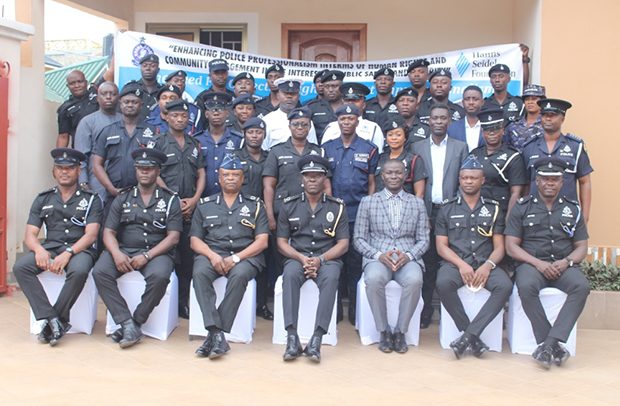DCOP Dr. Ernest Owusu, Dr. Gbande Dare in a group photograph with participants and resource persons
The Police Administration has begun training personnel on human rights issues as part of enhancing their police professionalism efforts.
The training programme is under the auspices of the Research, Planning and Transformation Directorate (RPRD) of the Ghana Police Service with funding from Hanns Seidel Foundation (HSF), a German political foundation to promote governance and civic education.
At the official opening of a four-day programme for 30 police personnel in Accra, the Director-General of RPRD, Deputy Commissioner of Police (DCOP) Dr. Ernest Owusu, who represented the Inspector General of Police Dr. George Akuffo Dampare, said the current Police Administration has come out with several interventions and strategies to enhance personnel potential for effective service delivery to restore and build public trust.
He said the training programme is designed to equip participants with requisite skills to enhance personnel professionalism in order to undertake operations effectively, and for the police to be most civil to the public in building better police-public relations.
“Some of the topics to be discussed are police responsibility and professionalism, position of stakeholders integrity and the four thematic goals, historic background of policing and police transformational process, policing and media, code of conducts and ethics, human rights in policing, and law enforcement supervision and community policing,” he added.
DCOP Owusu urged the personnel of the service to be professional in the discharge of their duties, and commended Hanns Seidel Foundation for the support over the years to promote security and stability in the country.
The Officer of Monitoring and Evaluation of Hanns Seidel Foundation, Dr. Gbande Dare, urged the participants to be agents of change, apply and impart knowledge they have acquired for the benefit of all.
He also commended the Police Service for their contribution to ensuring peace and stability, and assured them of their continuous support to help them in their mandate.
By Linda Tenyah-Ayettey


